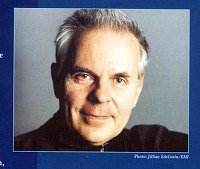
A large audience was privileged to eavesdrop upon Stephen Kovacevich,
renowned Beethoven specialist, taking well equipped students through passages
in Beethoven sonatas.
His manner was gentle and kindly, but searching and demanding. He put his 'victims' at ease by establishing whether each felt nervous or confident, and made them think and articulate their aims in dialogue with him - "tell me what you might not have liked in how you played that?" - before suggesting his own preferred solutions and persuading them to try it differently, but leaving final choices to them. In an absorbing one and a half hour session without pause he explored the Appassionata with an Israeli student from the Royal Academy of Music in London (Inon Barnatan) and Op. 109 with a Japanese graduate of the capital's Royal College of Music (Mami Shikimori).
Both were technically assured and knew the music so well that they could take up at will at any point as required - "we can work on a certain level" he assured them, and both responded well, changing articulation and tone easily (it is essential for master class candidates not to over-learn their pieces, so that they retain flexibility and are not so wedded to their settled way with the music as to be unable to experiment with new ideas).
He wanted 'more sound' in the Appassionata's ff, finding the player at first 'too considerate, too musical'! The student explained that he was worried about being 'too aggressive'. There was detailed discussion of tempi. Allegro assai, assai = rather, - - 'energy, not speed'. He explored alternative fingerings to assure that notes which were 'not speaking' should sound as desired. Sforzando should be 'earned', & dolce 'prepared' - passages should not 'come out of the blue' - - 'make sure the chromatic implications come through - be careful not to be too expressive and conventional'. He wanted a descending bravura passage to 'explode at the bottom', but the tempo to not be pushed, 'keep the same relentless tempo'. He discussed body language - at the start of the slow movement the pianist should be 'more physically vulnerable', and he found the finale 'a little too quick, like Mendelssohn', wanting the passage work darker.
In Op. 109, 'prestissimo means extreme - it shouldn't be comfortable for anyone, player or listener - it needs some sense of danger'. Discussing the pianist's thinking at the mezza voce beginning of the variation finale, he told her not to worry about projecting quiet music - ' don't give it to the people, bring them to you, trust the people to come to you, trust the sound'. It was alright to 'open up' in the first variation, but that should be 'in proportion, not abrupt'. He recommended her to be ' not too specific' in her interpretative decisions. Proportionality and continuity often figured in his assessments; on the return to the main theme - 'that sounded like a bad CD edit (of which I have experience!) without relationship to the sound before'.
A word about the screen placed high up on the wall behind the piano for this Harrods International Piano Series, so that the audience can 'see the hands' more closely, just as if on TV.
This is a distraction from concentrating upon the sound and seems to be a complete mistake, as well as being technically incompetent in its realisation. The projected keyboard is distorted grotesquely (seemingly 12 to 15 feet long) and there is no attempt to show the feet - more can often be learned about piano playing from watching a pianist's pedalling than from concentrating visually upon the finger work!
This master class was presented as something of an experiment during Stephen Kovacevich's extensive Beethoven series of recitals and concerto performances, which continue until May.
It worked well and undoubtedly proved an enriching experience for students and audience alike, with concentration wholly upon detail in Beethoven's music and how to best put it across; there was nothing of the great man reminiscing whilst the pupil waits to resume playing, which sometimes mars public teaching. There was no second piano for demonstration; the pupils themselves were required to think into new attitudes and to achieve different sounds, and Kovacevich was always generous in his recognition when that level of musicianship was achieved, usually immediately.
It was a tribute to the high standard of the best piano teaching now to be had at our conservatoires and colleges, exemplified the same evening, in the Purcell Room next door, by a distinguished piano recital of contemporary music in the PLG Young Artists Concerts, given by a Greek Goldsmiths College/RCM student of enormous promise (Eleni Liatsou).
Peter Grahame Woolf
Stephen Kovacevich's next Beethoven recital will be at QEH on Sunday afternoon 11 February, and he plays the Emperor Concerto at RFH on 10 March.
 Return to:
Return to: